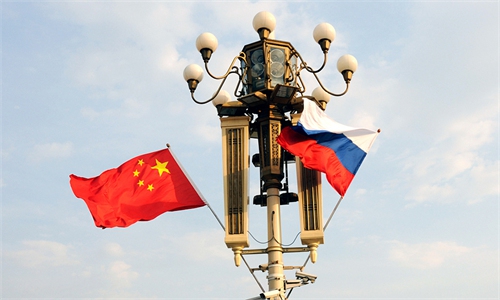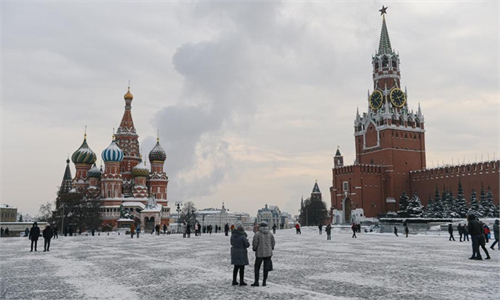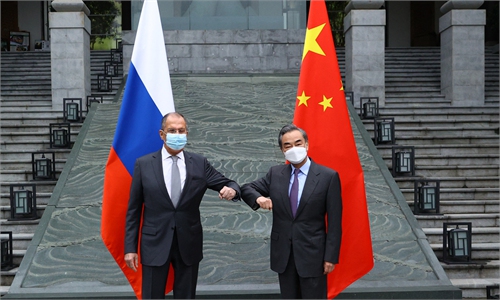China and Russia set example for international community to deter Western coercion

China Russia. Photo: VCG
Before embarking on his visit to China on Monday, Russian Foreign Minister Sergei Lavrov said in an interview with Chinese media that the West is "promoting their ideologized agenda aimed at maintaining their dominance by holding back the development of other countries," He said, "This policy… is 'on the wrong side of history."
According to Lavrov, the US and other Western countries are no longer capable of using classical diplomacy and only resort to one tool on the international arena: sanctions.
The US has relied on its status as the world's largest power and used sanctions as a usual method to coerce others. Some European countries have consciously or unconsciously followed the US steps in this regard.
These countries have smeared China as engaging in "coercive diplomacy." However, they have resorted to sanctions when they encounter differences under the banner of so-called rules and justice - such behavior itself is a practice of bullying and coercion.
They have also adopted measures severer than sanctions against others, such as starting wars and color revolutions. In such ways, they interfere in other countries' internal affairs to obtain benefits. As for the small group of countries represented by the US, such moves have a long history, which are based on the hegemony they have gained in the past century.
On the same day when Lavrov began his visit to China, US Secretary of State Antony Blinken also kicked off his four-day trip to Europe, which was described by some media outlets as a travel to "lobby" European countries.
The US' policy focusing on alliances has been built after WWII. Though the alliance system with NATO at its center has played its role for a long time, former US president Donald Trump was not a fan of the system as he thought the US had been taken advantage of in the system. And now the Biden administration is trying to recover the function of this system.
In regard to China and Russia, Washington hopes that its European allies can hold the same ground with it. At the same time, the US is pressuring allies that may have a different stance over some issues. For example, the US has been imposing unprecedented pressure on Germany over the Nord Stream 2 pipeline.
We can see that although the US maintains an alliance with European countries, they have different calculations and considerations on the issues concerning their respective key interests.
The US is now stuck in a self-contradiction: It needs allies but it has been quarreling with them about certain major affairs. This is actually a reflection of the sharp decline of US diplomatic capabilities and influence. Long gone are the days when Washington said "Yes," none of its allies said "No."
Countries around the world should unite to form a consensus against the actions of US-led countries that aim to interfere in their domestic affairs by means of sanctions. As Lavrov has said, China and Russia "have set an example to all countries on how to build relations with each other." This means the two countries adhere to the principle of non-interference while they are determined to cooperate in all spheres possible and take care of each other's core interests wherever and whenever it is necessary to do so.
Nonetheless, China and Russia will not, as some people believe, form a Western-style alliance or a bloc like one during the Cold War. The two countries have been engaging in comprehensive cooperation, taking a new path of external relations characterized by partnership rather than alliance.
In the face of some countries' coercive sanctions, China and Russia should adhere to international systems - the political structure with the UN and UN Charter at the center, and the economic construct with the World Trade Organization as the core. Even though both China and Russia are large powers and China has realized rapid development, they still should rely on the already existing multilateral mechanism, which to a great extent is still functioning, to address problems facing the international community, enhance cooperation in various spheres, and manage and resolve differences.
Despite the fact that neither China nor Russia has the intent to dominate the world order, the two countries' comprehensive partnership has set an example with a generally stabilizing effect on the global and regional situation. It can serve as a benign model for countries that are seeking win-win cooperation against the backdrop of a highly uncertain global political environment.
The article was compiled based on an interview with Lü Xiang, a research fellow at the Chinese Academy of Social Sciences. opinion@globaltimes.com.cn




